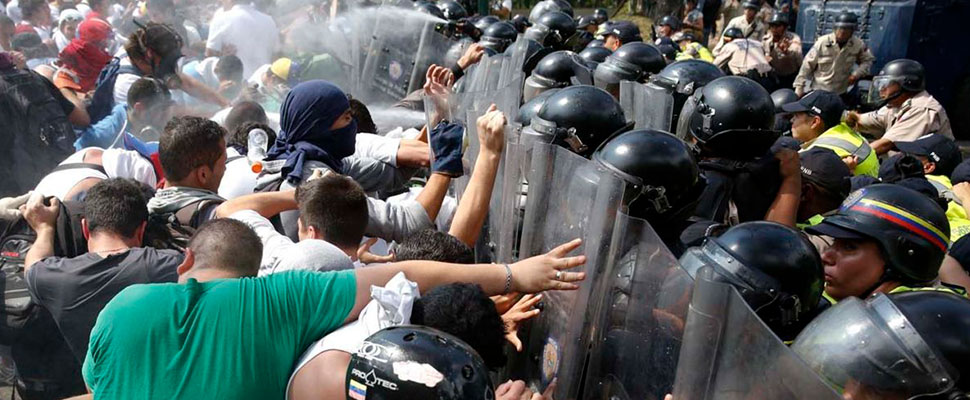Extrajudicial executions: the practice strengthens in Latin America
Authoritarian regimes in Latin America have not only violated democracy in the region but have standardized practices such as extrajudicial executions

That on the same day the Organization of American States (OAS) and Amnesty International (AI) have submitted reports on crimes against humanity, such as extrajudicial executions, in countries such as Venezuela and Nicaragua, it is not a mere coincidence but the demonstration of the grave situation of human rights and the degradation of the regimes that govern in these two countries.
Leer en español: Ejecuciones extrajudiciales: una práctica que toma fuerza en Latinoamérica
The denounced by both organizations resembles and recalls cases of countries like Colombia and Mexico, where extrajudicial executions have also taken place by state agents who, to demonstrate their ability to eliminate and persecute their opponents or simply demonstrate that they were winning an armed confrontation, ended up murdering defenseless civilians.
The events that took place in Colombia between 2002 and 2010 are well known by the international community, with extrajudicial executions carried out by members of the National Army, which the public opinion has known as false positives (falsos positivos, in Spanish). These false positives consisted in the murder of young people who were later presented by the troops as guerrillas killed in combat.
A recent article published by the British newspaper The Guardian refers to the book entitled: Ejecuciones extrajudiciales en Colombia, 2002 – 2010, in which its authors, Omar Rojas Bolaños and Fabián Leonardo Benavides, describe how the Colombian Army systematically killed approximately 10,000 civilians, all of them young people socio-economically vulnerable.
Regarding Mexico, last April the Inter-American Commission on Human Rights (IACHR) held a hearing on the Alvarado Espinoza y Otros Case. This case refers to the forced disappearance of Nitza Paola Alvarado Espinoza, José Ángel Alvarado Herrera, and Rocío Irene Alvarado by the Army of that country in 2009, within the so-called Operativo Conjunto Chihuahua (Operation Chihuahua Joint), which continues in impunity.
Extrajudicial executions documented in Venezuela since 2014
On May 29, the OAS General Secretariat presented a report made in conjunction with a panel of independent international experts, which analyzed the possible commission of crimes against humanity in Venezuela during the regime of Nicolás Maduro.
The panel of experts appointed by the Secretary-General of the OAS, Luis Almagro, concluded that there are sufficient grounds to consider that crimes against humanity have been committed in Venezuela, which date back to at least February 12, 2014.
Among its conclusions, the report highlights that 131 victims of murders that took place during the protests in 2014 and 2017, perpetrated by members of the State security forces and/or the so-called Collectives, were identified. Likewise, it identified 8292 extrajudicial executions documented since 2015.
Nicaragua, the abuses of the regime of Daniel Ortega
On the other hand, in its report entitled: "Shoot to kill: Nicaragua's strategy to suppress protest", Amnesty International denounced that the Nicaraguan authorities have unleashed a strategy of lethal repression against protesters who, since April 18, have protested against the regime of Daniel Ortega. According to Erika Guevara Rosas, Americas director at Amnesty International, the strategy has been characterized by the excessive use of force, extrajudicial executions, control of the media and the use of vigilante groups (or Sandinista mobs) to stifle protests in which at least 81 people have died.
In that sense, Amnesty International emphasizes that to conclude that multiple extrajudicial executions have been committed, indications were taken IGNORE INTO account such as:
- The use of lethal weapons by the police
- Wounds with a firearm
- The concentration of bullet wounds in the head, neck, and chest of the murdered people
- Attempts to obstruct justice and conceal the nature of the facts
The protests in Nicaragua are led mostly by young people and university students who are opposed, in principle to the pension reform that Daniel Ortega wanted to promote, and in general to the regime established in that country.
"The government of President Ortega must allow the creation of an international commission to carry out an immediate, impartial and effective investigation, and, if necessary, to bring charges against persons suspected of committing and ordering extrajudicial executions or excessive use of force, as well as other serious violations of human rights and crimes under international law," assured Guevara Rosas.
The commission of extrajudicial executions threatens the already weakened Latin American democracy, human rights, and civil liberties.
Latin American Post | Samuel Augusto Gallego Suárez
Translated from "Ejecuciones extrajudiciales: una práctica que toma fuerza en Latinoamérica"





